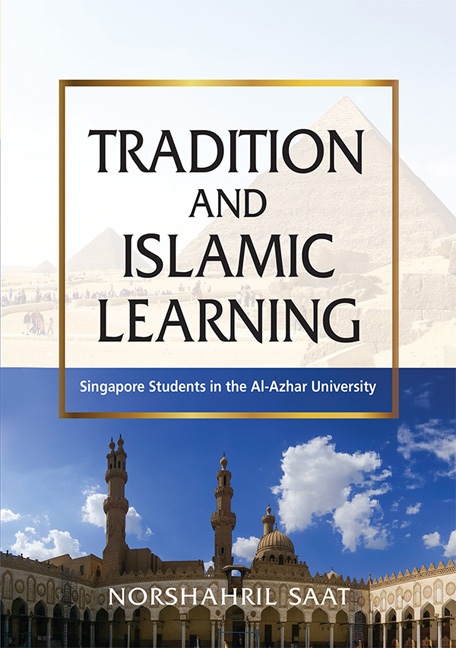Book contents
- Frontmatter
- Dedication
- Contents
- Preface
- Acknowledgements
- Abbreviations
- A Note on Translation, Spelling and Other Conventions
- Chapter 1 Introduction: Islamic Education and Religious Authority
- Chapter 2 The Al-Azhar University: A Historical Sketch
- Chapter 3 Prominent Southeast Asian Al-Azhar Graduates
- Chapter 4 Al-Azhar Today: The Experience of Singapore Students
- Chapter 5 Conclusion
- Bibliography
- Index
- About the Author
- Frontmatter
- Dedication
- Contents
- Preface
- Acknowledgements
- Abbreviations
- A Note on Translation, Spelling and Other Conventions
- Chapter 1 Introduction: Islamic Education and Religious Authority
- Chapter 2 The Al-Azhar University: A Historical Sketch
- Chapter 3 Prominent Southeast Asian Al-Azhar Graduates
- Chapter 4 Al-Azhar Today: The Experience of Singapore Students
- Chapter 5 Conclusion
- Bibliography
- Index
- About the Author
Summary
Would the political turmoil in the Middle East deter parents from sending their children to study in Al-Azhar University? Is Al-Azhar education suited for the modern world? Al-Azhar has been the centre for Islamic education in the world since its inception in the tenth century. The university has produced prominent ulama in the Malay world, and some made their mark as the countries’ Islamic intellectuals and thinkers. They have contributed in scholarship, led Islamic bureaucracy, and most importantly, became the voice of conscience to the community.
Prominent Al-Azhar graduates from Singapore include the former Mufti, Shaikh Syed Isa Semait and the current Mufti, Dr Muhammad Fatris Bakaram. Some of these Al-Azhar graduates ended up as judges in the Shariah court, but most of them serve in the local mosques and teach in local madrasahs. Al-Azhar remains the popular destination for Singapore religious studies students because of the closeness in terms of religious orientation between Singapore and Egypt, in which both communities largely follow the Shafie school of thought. Even though Saudi Arabia and other Gulf states offer Singapore students lucrative scholarships, and also close proximity to Islam's holiest sites in Mecca and Medina, Al-Azhar remains Singaporean Muslims’ top choice. The other popular destination for students would be Malaysia, but the universities in the country also modelled their curriculum after the Al-Azhar University.
Through my conversations with Al-Azhar graduates from different cohorts, I find that there is not much generational divide in terms of experience of students studying in Al-Azhar. Their style of learning continues to emphasize on memorizing, even though, increasingly, there has been more emphasis on critical thinking. Some students complain that they would learn more if they are given more assignments because that would bring them closer to reading materials, where they would have to source for books not assigned by their lecturers. This has been the practice in modern universities. Moreover, classes in the Al-Azhar University are not compulsory for the students, and they need to be motivated and disciplined in order to come to campus, even though the system has penalties for students who skip classes regularly: they will not be able to pass their exams well if they miss classes often, because they are not familiar with the issues raised in class.
- Type
- Chapter
- Information
- Tradition and Islamic LearningSingapore Students in the Al-Azhar University, pp. 93 - 102Publisher: ISEAS–Yusof Ishak InstitutePrint publication year: 2018

